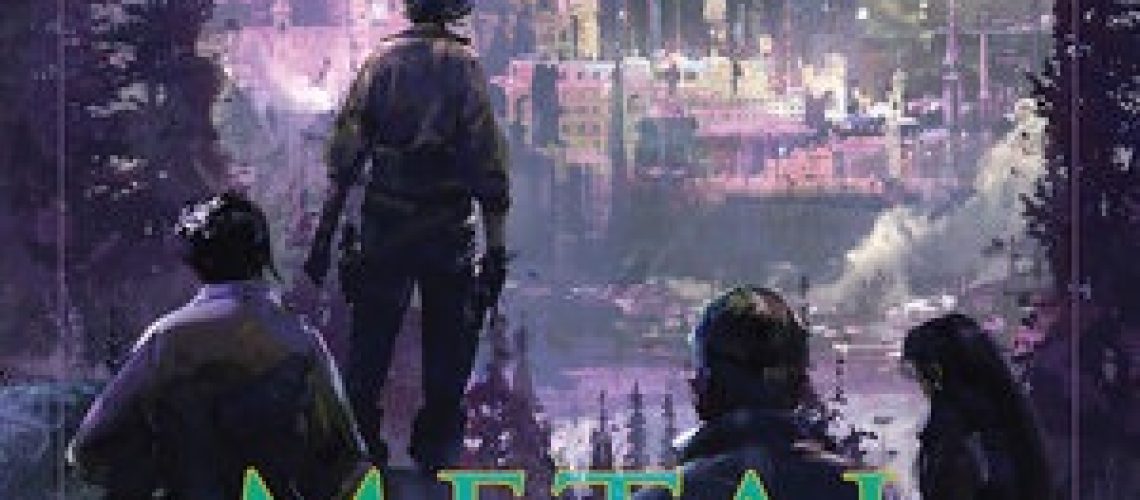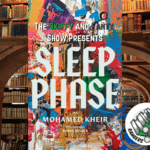August Clarke’s Metal from Heaven is a slippery, genre-defying science fantasy novel that always has a trick up its sleeve coming up for the reader…especially right at the very end.
Marney Honeycutt has had a hard life even before the strikebreaking that killed her family. Living in the city of Ignavia, working in a factory refining the wonder mineral Ichorite, a strike against brutal conditions is put down even more fiercely, leaving her the only survivor of her family. By turns, she winds up with a group of anarchists, and with a burning mission—to avenge her family by killing Yann Chauncey, the owner of the factory that ordered the execution. But the course of revenge, like the course of love, never runs smooth.
This is especially true in Metal from Heaven, by August Clarke.
The novel is a slippery and treacherous thing. Among the many influences in the acknowledgements is Nine Princes in Amber by Roger Zelazny. And one way that the novel clearly is in dialogue with Zelazny is in the choice of voice. Our narrator, Marney Honeycutt, is telling her story, this story, *to* someone. It’s clearly someone intimate, someone important, someone that the narrator knows. But the narrator does not reveal who that person is, but that person is thus embedded in the narrative as a mystery right from the get go. That is very much in the Zelazny mold.
But the novel itself is extremely malleable, chimeric and amorphous in that regard. It starts off as a novel interested in worker’s rights…and changes into a novel about anarchy and communes with the equivalent of a pirate town, as we watch Marney grow into who and what she is. It’s a novel that explores Marney’s power and disability, her toxic ability to manipulate Ichorite, that both poisons her and yet is also malleable to her magical power.
It’s a novel about relationships, and love, and gender and identity. I’ve been using she/her pronouns for Marney but that’s not quite accurate. There are a variety of languages and cultures in this world (and the worldbuilding in this novel is quite the highlight, it’s an extremely rich and vibrant and vivid world with all the senses at work and being worked). The variety of languages and cultures lets Clarke do a clever thing and compare and contrast them in terms of how they see sex and gender, and thus there is a wide variety of formulations of both. And thus just what gender Marney is can depend on what culture and language she is immersed in at the time, which is a really interesting thing, and it reflects our own issues as our societies struggle with acceptance of the diversity of gender norms. And as such who people love and how they love and even who they are break the gender binary, or more belike, smash it into ruins in the process.
And then there is a whole section that acts as an Edwardian comedy of manners (with some deadly asides) as Marney winds up in the middle of a set of suitors vying for the hand of the daughter of the man she has vowed to kill. Dangerous social situations put Marney in a situation and a setting utterly unlike what has come before, yet another gear-switching on the author’s part. And that is not even where the novel finally lands, as it continually changes things up time and again, for the reader. (our point of view is always Marney).
The point of all of this is that the novel is wildly ambitious and takes what is undeniably some very big swings in all sorts of directions in terms of worldbuilding, character, plot and the ideas explored. I don’t think it hits all of its targets, possibly because the author sprays her ideas in all directions and doesn’t always follow through afterwards as strongly as they might before going on to the next thing. That is the pattern: set up, take a big swing and then introduce the next thing. Nothing is disposable, it’s a layered palimpsest, but it feels like the book is several stories, one on top of the other, with Marney’s revenge as what keeps her on focus and tasks. It also makes the reading experience of this book extremely strange and phantasmagorical. I called it science fantasy because there are few labels that accurately and completely capture just what this novel is doing and the motifs and patterns it is borrowing, remixing and reinventing.
It is a book that doesn’t quite live on vibes as much as, say, Tamsyn Muir’s Gideon the Ninth (NB: Harrow the Ninth is mentioned in the acknowledgements under influences), but I think it fits in a similar space in some ways, both to the good and to the bad. It’s not the same kind of genre blending and transgression of boundaries, but it’s the same sort of gleeful approach to same, and I suspect that, similarly, the first fifteen chapters of this book will be either extremely your jam, or extremely not what you want in your reading.
The language is gorgeous, when it is not visceral. It’s enthrallingly beautiful, even when blood is spilled. The plotting and character maneuvers are byzantine, except when they cut to the heart of the matter. It’s a book that made me lose track of time in reading it, again and again, in its first fifteen of the seventeen chapters of the novel.
And then there are the final pair of chapters. The ending of the book is one of the weirdest mindscrew chapters I have read or consumed in any work of fiction, period. One of those acknowledgements of inspirations mentioned above is “The End of Evangelion.” I am not a fan of a lot of anime, and I’ve never actually watched “Neon Genesis Evangelion.” I understand, however, that the end of the anime is a mindscrew and a surreal experience that is still being debated and argued about. (For me, my equivalent would be the ending to “The Prisoner.”) In any event, the last chapters of Metal From Heaven radically shifts tone, and viewpoint, and perspective. I really don’t want to give it away, that would be unfair.
And I am still trying to come to terms with what it all means, and what it means for the book. In the penultimate chapter, I felt like I had a pretty good handle on this ever changing and evolving book. Just like Heracles trying to hold onto the shape-changing Proteus during their fight, or Janet holding onto Tam Lin as the faeries change his form over and over, I thought until I got to the last two chapters that I had a hold of the book. I had deduced just who Marney has been talking to all this time. The lines of the plot and her story and character arcs seemed clear. As protean as the novel was, I felt like I had it in the compass of my thought and mind.
And then the last two chapters, and I am left again, even a couple of weeks after reading, trying to make sense of it all. Chapter Sixteen plays with language and form, fragments of sentences and things that might be poetry, or coming to understanding. I don’t know. The last chapter is still the mind screw, but less raw, more confident, the final form of the book. It’s an audacious ending, one that took an even bigger swing than any of the others prior to that in the book.
Does it connect?
I can see how for a lot of people it won’t. This book in general is vivid, breathtaking, and when it connects, it hits the long ball. When it fails…it is a sharper disappointment than anything. I think the last chapters work even as I still try to make sense of them. But perhaps August Clarke meant for the finale to be decisive and confusing and unclear. If so, like with much of this book, they wildly succeeded.







